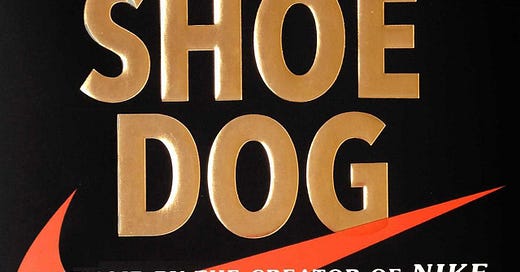In his memoir, Phil Knight, the co-founder of Nike shares the journey from the time he started the company to everything that happened to make it the household name it is now. While there are peaks into his personal life - the thought process, who he looked up to, what he struggled with - the book is mostly focused on the company and the people that worked there.
As a runner at the University of Oregon, Knight knew a thing or two about it. While studying at Stanford, he wrote a paper on running shoes and got obsessed with the idea of manufacturing high-quality low-cost shoes for runners. In the end, he ended up creating the market leader in global sports footwear with revenue of $24B in 2018.
So is the moral of the story you need to work hard on your passion and you will succeed? Not quite.
While Knight did follow his dreams, there were a lot of factors that worked out for him and Nike:
While his father gave him money to travel to Japan in 1962, he also introduced him to his contacts in Tokyo, who guided Phil on dealing with Japanese businessmen
More importantly, Bill Bowerman - an American track coach who produced more than 30 Olympians - was his coach and also his business partner. Bill knew a lot of top athletes who would try all his shoe iterations, he was also the son of a former Oregon governor, which also gave him more contacts
Chuck Robinson, Henry Kissinger’s deputy under President Ford, helped Knight and the Nike team in the late 70s as they were trying to establish production in China. He even convinced Phil Knight to go public when they were having severe cash shortages
An Aerospace Engineer Marion Franklin Rudy came up with the idea of placing tiny airbags in the soles of shoes to soften the impact and presented it to Knight. That is how Nike Air was born. Initially called “Tailwinds”, they had a lot of issues and resulted in returns.
And in spite of ALL this - the company ran into a lot of obstacles. From finding partners in Japan to start manufacturing to getting the money from banks to pay for those shoes. Everything from delayed deliveries and bad quality hurt the sales and brand of Nike. Yen’s value was constantly fluctuating, so they tried to find manufacturing partners in other countries which resulted in the original partners sued them in court.
When none of this was happening, a competitor Converse (which they now own) lobbied the government to put a tax on all the sales Nike had made. It just showed that when a company becomes that big, they will make some enemies and competitors will use all their power to stop them.
If you are reading this book as a budding entrepreneur and wondering what you can take away, here’s what comes to mind:
You will go nowhere without knowing the right people
Must know what you want to do with the product/company
Understand the strengths and weaknesses of the people who work for you
And then you have to work really hard and hope that luck is on your side. As Knight realized (while climbing Mt. Fuji on one of his Japan trips), there are many ways to come down but really one way to the top.




